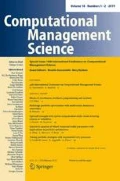Abstract
In this opinion paper, I argue that “optimization and sustainable development” indicates a set of specific engineering techniques rather than a unified discipline stemming from a unique scientific principle. On the other hand, I also propose a mathematical principle underlying at least some of the concepts defining sustainability when optimizing a supply chain. The principle is based on the fact that since demand constraints are usually expressed as inequalities, those which are not active at the optimal solution imply the existence of some wasted activity, which may lead to an unsustainable solution. I propose using flow-type equation constraints instead, which help detect unsustainability through infeasibility.










Similar content being viewed by others
References
Adhya N, Tawarmalani M, Sahinidis NV (1999) A Lagrangian approach to the pooling problem. Ind Eng Chem Res 38:1956–1972
Aronson J (1989) A survey of dynamic network flows. Ann Oper Res 20:1–66
Audet C, Brimberg J, Hansen P, Le Digabel S, Mladenović N (2004) Pooling problem: alternate formulations and solution methods. Manag Sci 50(6):761–776
Bartelmus P (1994) Environment, growth and devolopment. Routledge, New York
Belotti P, Lee J, Liberti L, Margot F, Wächter A (2009) Branching and bounds tightening techniques for non-convex MINLP. Optim Methods Softw 24(4):597–634
Bruglieri M, Liberti L (2008) Optimal running and planning of a biomass-based energy production process. Energy Policy 36:2430–2438
Bruglieri M, Liberti L (2009) Optimally running a biomass-based energy production process. In: Kallrath J, Pardalos P, Rebennack S, Scheidt M (eds) Optimization in the energy industry, energy systems. Springer, New York, pp 221–232
Cvetković D, Rowlinson P, Simić S (2010) An introduction to the theory of graph spectra. Cambridge University Press, Cambridge
D’Ambrosio C, Linderoth J, Luedtke J (2011) Valid inequalities for the pooling problem with binary variables. In: Günlük O, Woeginger G (eds) IPCO, vol 6655 of LNCS. Springer, Heidelberg, pp 117–129
Dantzig GB (1963) Linear programming and extensions. Princeton University Press, Princeton
Fourer R, Gay D (2002) The AMPL book. Duxbury Press, Pacific Grove
Hamadi Y, Liberti L (2011) Microsoft-CNRS chair “Optimization for Sustainable Development”. Activity report 2009–2011. Technical report MSR-TR-2011-42, microsoft research
IBM (2010) ILOG CPLEX 12.2 User’s manual, IBM
Kennington J (1978) A survey of linear cost multicommodity network flows. Oper Res 26(2):209–236
Kirchler D, Liberti L, Wolfler Calvo R (2014) Efficient computation of shortest paths in time-dependent multi-modal networks. ACM J Exp Algorithmics (to appear)
Kotnyek B (2003) An annotated overview of dynamic network flows. Technical report 4936, INRIA, Sept. 2003
Liberti L (2009) Reformulations in mathematical programming: definitions and systematics. RAIRO-RO 43(1):55–86
Misener R, Floudas C (2010) Global optimization of large-scale generalized pooling problems: quadratically constrained MINLP models. Ind Eng Chem Res 49:5424–5438
Nannicini G, Baptiste Ph, Barbier G, Krob D, Liberti L (2010) Fast paths in large-scale dynamic road networks. Comput Optim Appl 45:143–158
Nannicini G, Liberti L (2008) Shortest paths in dynamic graphs. Int Trans Oper Res 15:551–563
Pallottino S, Scutellà MG (2014) Shortest path algorithms in transportation models: classical and innovative aspects. In: Marcotte P, Nguyen S (eds) Equilibrium and advanced transportation modelling. Kluwer, Dordrecht, pp 245–281
Pallottino S, Sechi G, Zuddas P (2005) A DSS for water resources management under uncertainty by scenario analysis. Environ Model Softw 20(8):1031–1042
Papadimitriou CH, Steiglitz K (1998) Combinatorial optimization: algorithms and complexity. Dover, New York
Porcheron M, George A, Juan O, Simovic T, Dereu G (2010) Challenge ROADEF/EURO 2010: a large-scale energy management problem with varied constraints. Technical report. http://challenge.roadef.org/2010/files/sujetEDFv22, Electricité De France, Recherche et Développement, February 2010
Roda F, Hansen P, Liberti L (2011) The price of equity in the hazmat transportation problem. In: Nicosia G, Pacifici A (eds) Proceedings of Cologne/Twente workshop. Università di Roma 2, Tor Vergata, Rome, pp 235–238
Tahanan M, van Ackooij W, Frangioni A, Lacalandra F (2014) Large-scale unit commitment under uncertainty: a literature survey. 4OR (submitted)
World Commission on Environment and Development (1987) Our common future. Oxford University Press, Oxford
Acknowledgments
I am extremely grateful to Microsoft France and Microsoft Research for the “Optimization and Sustainable Development” Chair endowment, which helped sponsor more than four years of research in optimization and sustainable development topics at LIX, École Polytechnique. Specifically, I would like to acknowledge the scientific contributions of Philippe Baptiste, Claudia D’Ambrosio, Youssef Hamadi, Vincent Jost, Dominik Kirchler, Fabio Roda, David Savourey and Roberto Wolfler Calvo, as well as the invaluable help of Sylvie Tonda-Goldstein, Valérie Masson-Patrimonio, Evelyne Rayssac and Pierre-Louis Xech. I am also extremely grateful to a referee for very precious suggestions about this paper.
Author information
Authors and Affiliations
Corresponding author
Rights and permissions
About this article
Cite this article
Liberti, L. Optimization and sustainable development. Comput Manag Sci 12, 371–395 (2015). https://doi.org/10.1007/s10287-014-0219-5
Received:
Accepted:
Published:
Issue Date:
DOI: https://doi.org/10.1007/s10287-014-0219-5




